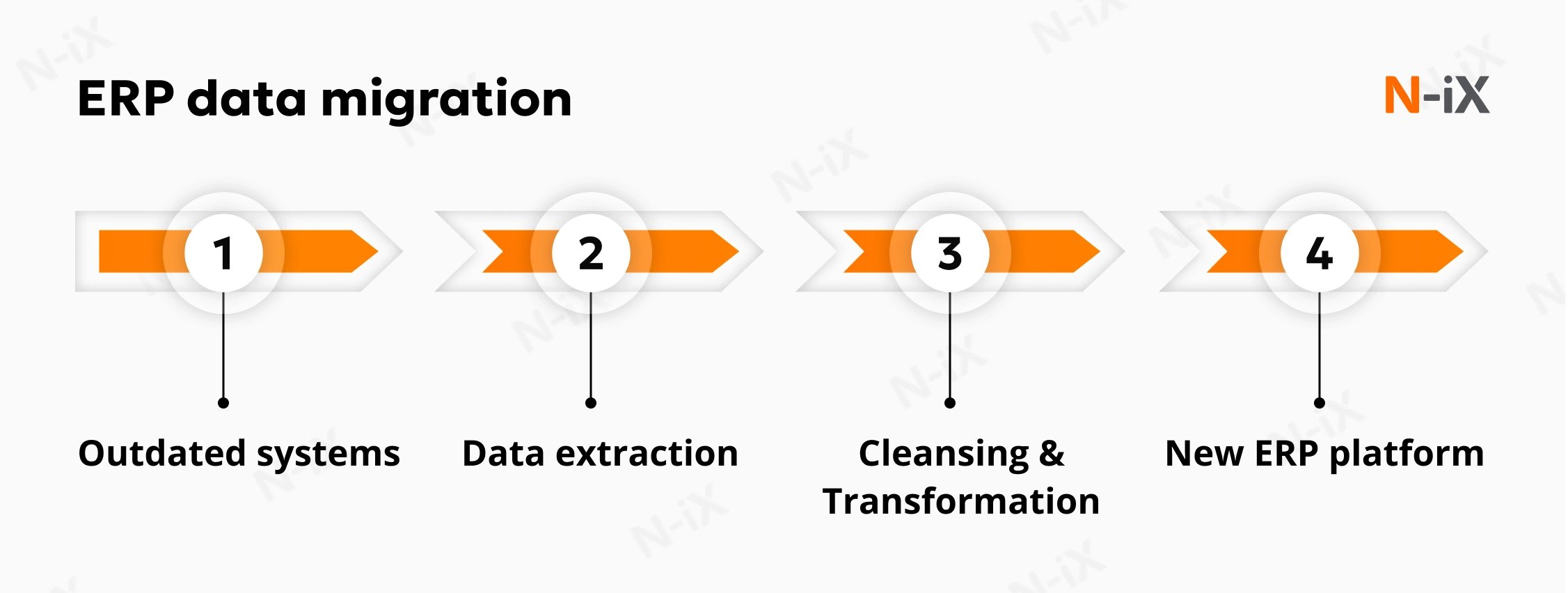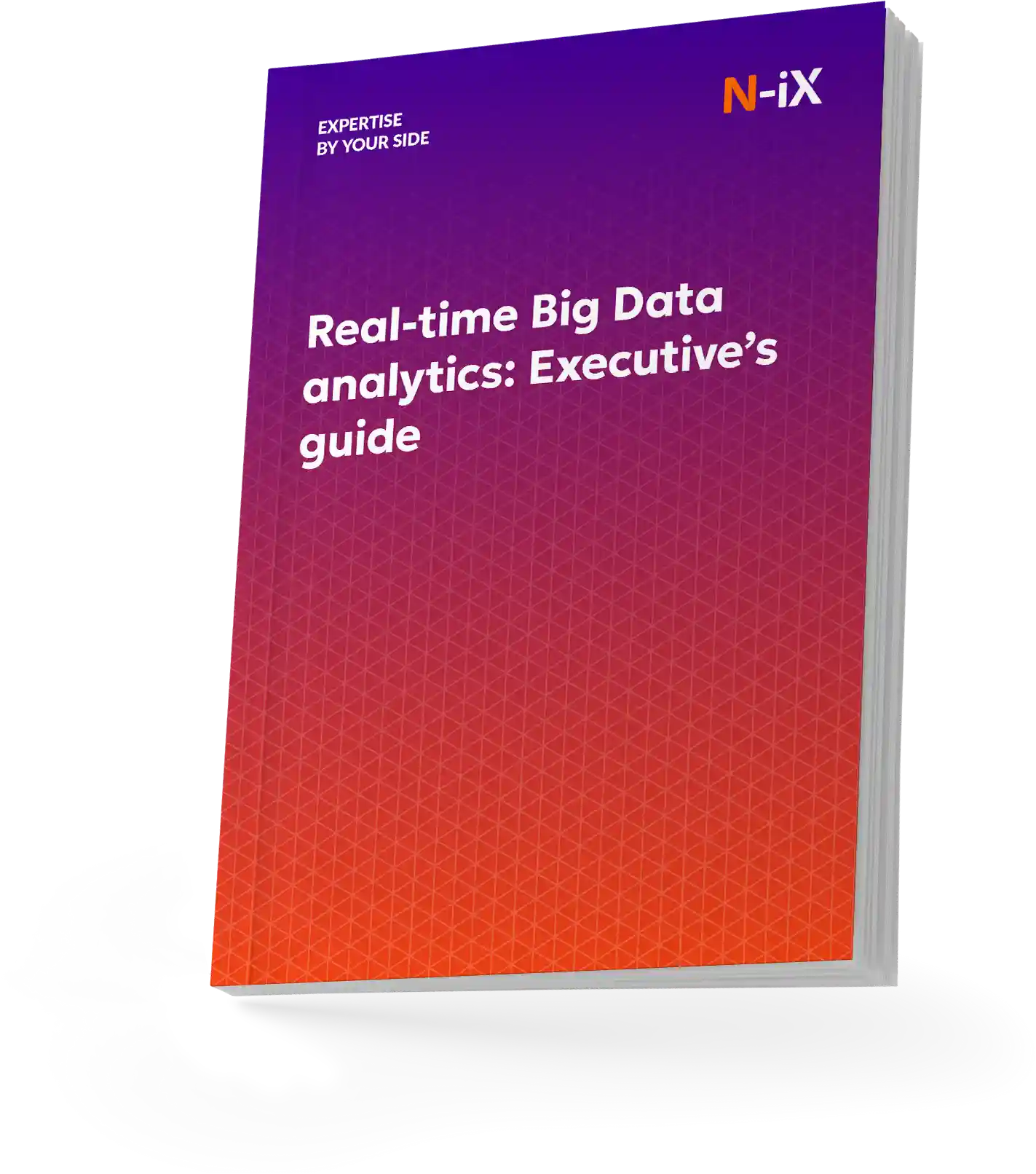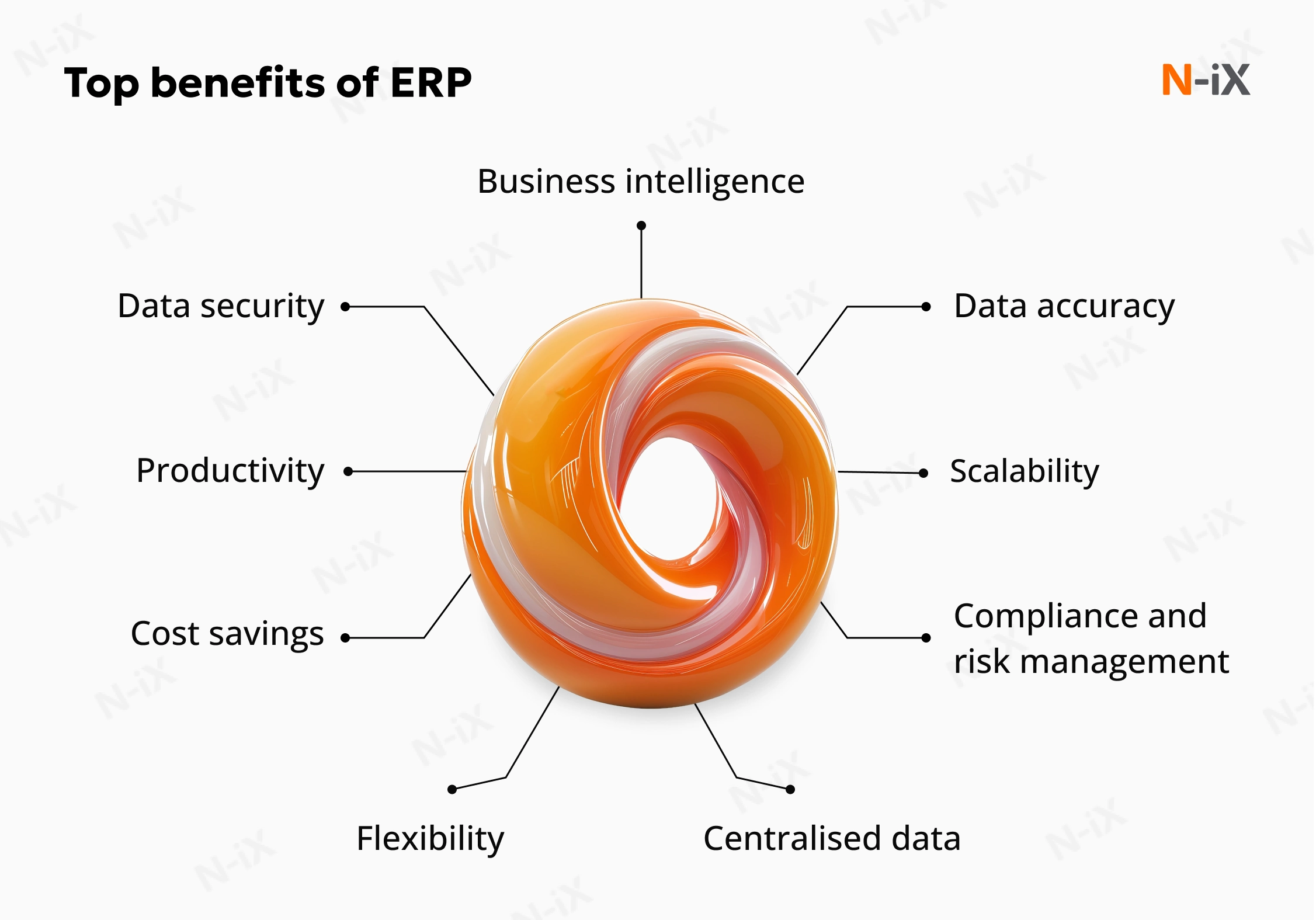Enterprise Resource Planning (ERP) systems are the backbone of business operations, connecting finance, supply chain, and HR into one ecosystem. As enterprises modernize their technology stacks, ERP data migration becomes a critical step toward efficiency. However, migrating large volumes of business data without disrupting daily operations is a complex process that demands more than technical execution. It requires a deep understanding of how the ERP environment supports business goals.
At N-iX, we help enterprises migrate their ERP data securely and efficiently and customize ERP systems to their business needs. Leveraging our data and analytics services, we ensure that every migration lays a strong foundation for reliable insights, better decision-making, and long-term scalability. From assessment and planning to implementation and integration, our team ensures that every migration lays the groundwork for a more flexible and future-ready landscape.
To understand how to approach it effectively, let's start with what ERP data migration entails and why it matters.
What is ERP data migration?
ERP data migration is transferring critical business information from old systems into a new ERP platform. This data includes everything that keeps operations running, from invoices, purchase orders, and inventory records to employee, supplier, and customer records.
The goal is to consolidate all information within a unified, modern system that can be accessed, analyzed, and shared seamlessly across departments. For many enterprises, migration becomes necessary when older ERP platforms reach end-of-support, can't scale with business growth, or lack integration capabilities.
Because most companies store data in multiple formats and locations, ERP data migration requires extracting, cleansing, transforming, and loading data to preserve integrity, eliminate redundancy, and support the business logic of the new ERP environment.

When appropriately executed, data migration:
- Maintains business continuity during the transition;
- Provides stakeholders with accurate historical data for analysis and reporting;
- Preserves data consistency across organizational functions;
- Reduces the risk of operational disruptions post-implementation.
That's why N-iX treats data migration as a strategic foundation of every ERP implementation. Our teams focus on data integrity, accuracy, and traceability so enterprises get the full value of their new ERP systems from day one.
Read more: ERP modernization: How to do it right
Common challenges in ERP data migration
ERP migration is far more than transferring files from one system to another. The accuracy of data, continuity of workflows, and ability to make decisions depend on how effectively information is extracted, cleaned, and restructured. Understanding these challenges early helps enterprises minimize risk and ensure a smooth transition.
Data quality
Legacy systems often contain redundant, inconsistent, or outdated data. This information can lead to reporting errors, inefficiencies, and unreliable insights when it is migrated to a new ERP environment.
N-iX approach: Before migration, we conduct comprehensive data profiling and cleansing to remove duplicates, standardize formats, and align datasets with business rules. This ensures that only accurate, relevant data enters the new system, setting a strong foundation for reliable analytics and decision-making.
Adopt real-time Big Data analytics for instant visibility—get the guide!


Success!

Resource constraints
Extracting and transforming data locked in multiple silos requires time, specialized expertise, and continuous coordination across teams.
N-iX approach: Our delivery model brings together cross-functional teams of data engineers, ERP specialists, and business analysts. We facilitate extraction, validation, and transformation processes using frameworks and automation tools to reduce manual workload and accelerate timelines.
Integration with other systems
Connecting a new ERP with existing tools, such as CRM, HR, or ecommerce platforms, can be complex. Poorly managed integrations often cause data mismatches and operational gaps.
N-iX approach: Our engineers design top-notch integration frameworks with governance rules that control how and when data flows between systems. This ensures accuracy and seamless communication across the enterprise ecosystem.
Legacy ERP complications
The more customized an existing ERP system is, the more complex and time-consuming the migration becomes. Hidden dependencies and non-standard configurations often delay the process.
N-iX approach: We start with a comprehensive system assessment to map out all customizations, integrations, and dependencies. This allows us to design tailored migration paths that preserve essential business logic while modernizing the underlying architecture.
Compliance and security
Transferring sensitive business data from multiple sources requires strong governance and compliance with evolving data protection standards.
N-iX approach: Our engineers build secure migration frameworks that include encryption, role-based access controls, and continuous monitoring. We align data migration workflows with GDPR and industry- and location-specific regulations to ensure security and audit readiness.
Downtime and disruption
Data migration often involves system downtime, which can slow operations and reduce productivity if not carefully managed.
N-iX approach: We use phased migration strategies and sandbox testing to minimize disruption. Critical business functions continue running while data is verified and transitioned in controlled stages, reducing the risk of unplanned downtime.
The benefits of cloud ERP solutions

Traditional on-premises ERP systems run on servers owned and maintained by internal tech teams. They require physical space, continuous maintenance, and complex data transfers when legacy hardware reaches its limits. As a result, more organizations are moving to cloud ERP solutions that offer scalability without the heavy capital investment or maintenance burden.
These platforms eliminate the need for dedicated hardware and constant IT oversight. The ERP provider handles fixes, upgrades, and maintenance under a predictable subscription model. Businesses can scale storage, add new modules, or integrate third-party applications as they grow, all without major disruptions.
Cloud ERP also brings flexibility. Organizations can adapt faster to changing regulations and business models by connecting and standardizing data that once lived in silos. Built-in analytics and AI tools provide leaders with actionable insights, helping them spot trends and anticipate market shifts. Security is another major driver: modern cloud systems enable continuous monitoring, faster patching, and greater transparency into compliance through dedicated vendor support.
Still, the move to cloud ERP isn't only about adopting new technology. Many enterprises face growing limitations in legacy ERP platforms, including poor scalability, limited integration capabilities, and a lack of cloud features required in today's data-driven environment. As operations expand, these systems struggle to handle the complexity and regulatory demands.
For example, a healthcare organization relying on outdated ERP software may find it increasingly challenging to meet HIPAA requirements or ensure data security. In such cases, migrating to a modern, secure cloud ERP becomes a strategic upgrade and a business necessity that enables compliance, resilience, and long-term growth.
With the advantages of cloud ERP in mind, successful adoption ultimately depends on a well-executed data migration strategy.
ERP data migration best practices
The following ERP data migration checklist summarizes key steps and proven methods that help enterprises plan, execute, and validate their migration with confidence. At N-iX, these best practices form the foundation of our ERP data migration strategy, combining technical accuracy, governance, and business alignment to deliver secure, disruption-free migrations.
ERP data migration plan
We start with a detailed ERP data migration plan that outlines the project's scope, responsibilities, and timeline. Our experts assess existing data sources, establish extraction and cleansing procedures, and allocate resources effectively to prevent bottlenecks later in the process. This early planning ensures your ERP implementation stays on schedule and within scope.
Aligning data migration with business objectives
We help you analyze how your existing data will be used within the new ERP system, map it to the ERP database structure, and define rules for translating it into the new format. A well-planned ERP data migration doesn't just move information but aligns it with business intelligence goals, enabling better real-time insights across departments.
Data cleansing and validation for successful migration
Poor data quality is one of the leading causes of ERP project overruns. That's why N-iX teams perform thorough cleansing and validation, removing duplicates, correcting inconsistencies, and standardizing formats. Using automated validation tools and governance frameworks, we ensure that only accurate, reliable data is loaded into your new ERP platform.
Implementing effective data governance
We establish clear data ownership and governance frameworks to maintain consistency and compliance. Our experts define who is responsible for reviewing and approving datasets before migration. This step is particularly critical under regulations like GDPR or CCPA, where data mismanagement can result in regulatory penalties.
Focusing on high-value data for performance
Not every piece of historical data adds value to the new ERP system. Importing unnecessary or outdated records can slow down performance and complicate reporting. We help you identify which data adds the most business value to the new ERP system.
Comprehensive documentation and post-migration support
Our process includes comprehensive documentation of every stage of ERP data migration. This transparency simplifies future updates and supports internal training. After the migration, we provide support: monitoring data consistency, resolving emerging issues, and ensuring the new system performs as intended.
Once best practices are in place, the next step is executing them effectively, and that's where the N-iX team brings proven expertise.
How N-iX conducts a smooth ERP data migration
With over 23 years of experience and long-term partnerships with global enterprises, we combine deep business knowledge with robust data management practices to ensure secure, disruption-free migrations.
Our ERP data migration strategy is integrated into every stage of our custom ERP development and ERP customization services, ensuring that your ERP ecosystem is ready to support long-term growth.
Proven approach backed by enterprise experience
We begin with a deep understanding of your data landscape, identifying dependencies, defining ownership, and setting clear validation and compliance rules. Our engineers leverage advanced data migration and database management tools to minimize downtime and ensure a smooth transition, whether moving from legacy systems or upgrading to cloud-based ERP.
Data quality and business alignment
We help you cleanse, validate, and map data to ensure accuracy and consistency across all systems. This not only prevents delays and errors but also enhances business intelligence capabilities. According to Techaisle, enterprises partnering with N-iX report up to 66% higher operational efficiency and 62% cost reduction through optimized ERP systems.
Measurable results of our ERP services
Our data migration expertise is reinforced by our ERP Development, helping enterprises achieve measurable outcomes:
- Minimize the total cost of ownership by optimizing ERP implementation
- Streamline data migration for a smooth transition to the new ERP system
- Deliver a thoroughly tested ERP platform that mitigates operational risks
- Optimize long-term ERP ownership through maintainable and scalable architectures
- Facilitate a seamless user experience with comprehensive ERP training
- Empower teams to leverage ERP capabilities for smarter decision-making
End-to-end ERP transformation
At N-iX, ERP data migration is just one part of a broader digital transformation journey we help enterprises achieve. Our teams deliver full-cycle ERP services, from consulting and architecture design to implementation, integration, and post-launch optimization.
We start with ERP consulting to identify process gaps, assess readiness for change, and define a clear business case with TCO and ROI in mind. Our custom ERP development approach tailors systems to your workflows, ensuring you get only the features that add value and drive measurable efficiency.
Through seamless implementation and migration, we minimize downtime and disruption, ensuring data integrity and user adoption. With custom ERP dashboards and cloud-based solutions, we make real-time insights accessible across your organization, empowering teams to act on accurate, connected data.
Bottom line
A successful ERP data migration is only one step toward complete digital transformation. At N-iX, we go beyond data transfer, we help enterprises design and build custom ERP systems that align with their business processes, integrate seamlessly with other enterprise tools, and scale with growth.
With over 200 data, AI, and ML experts, and 60 successfully delivered data and AI projects, N-iX brings the technical depth and delivery excellence recognized by ISG as a Rising Star in Data Engineering.
Whether modernizing an outdated platform or developing a new cloud-native ERP solution, our team ensures your system delivers measurable business value: greater visibility, operational agility.
Drive business efficiency with a secure, compliant ERP data migration strategy tailored to your enterprise. Ensure a smooth transition and long-term ERP success with N-iX.
Have a question?
Speak to an expert




